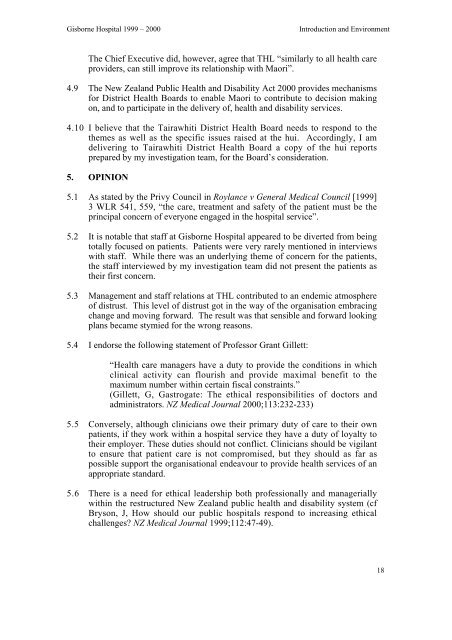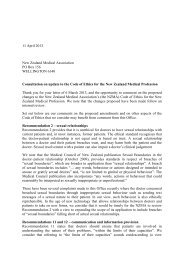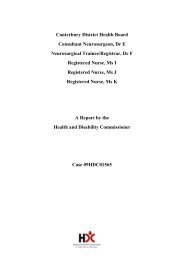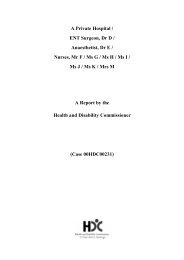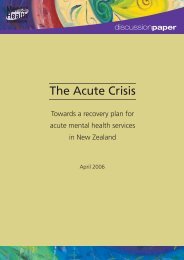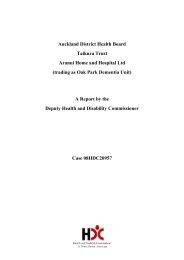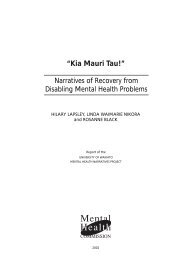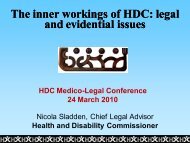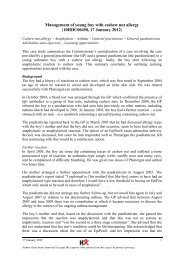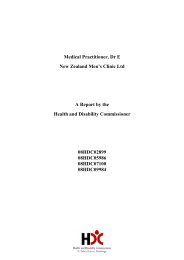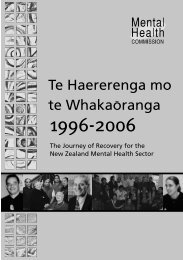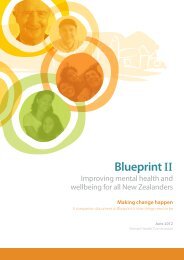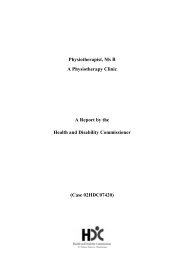Gisborne Hospital Report - Health and Disability Commissioner
Gisborne Hospital Report - Health and Disability Commissioner
Gisborne Hospital Report - Health and Disability Commissioner
You also want an ePaper? Increase the reach of your titles
YUMPU automatically turns print PDFs into web optimized ePapers that Google loves.
<strong>Gisborne</strong> <strong>Hospital</strong> 1999 – 2000<br />
Introduction <strong>and</strong> Environment<br />
The Chief Executive did, however, agree that THL “similarly to all health care<br />
providers, can still improve its relationship with Maori”.<br />
4.9 The New Zeal<strong>and</strong> Public <strong>Health</strong> <strong>and</strong> <strong>Disability</strong> Act 2000 provides mechanisms<br />
for District <strong>Health</strong> Boards to enable Maori to contribute to decision making<br />
on, <strong>and</strong> to participate in the delivery of, health <strong>and</strong> disability services.<br />
4.10 I believe that the Tairawhiti District <strong>Health</strong> Board needs to respond to the<br />
themes as well as the specific issues raised at the hui. Accordingly, I am<br />
delivering to Tairawhiti District <strong>Health</strong> Board a copy of the hui reports<br />
prepared by my investigation team, for the Board’s consideration.<br />
5. OPINION<br />
5.1 As stated by the Privy Council in Roylance v General Medical Council [1999]<br />
3 WLR 541, 559, “the care, treatment <strong>and</strong> safety of the patient must be the<br />
principal concern of everyone engaged in the hospital service”.<br />
5.2 It is notable that staff at <strong>Gisborne</strong> <strong>Hospital</strong> appeared to be diverted from being<br />
totally focused on patients. Patients were very rarely mentioned in interviews<br />
with staff. While there was an underlying theme of concern for the patients,<br />
the staff interviewed by my investigation team did not present the patients as<br />
their first concern.<br />
5.3 Management <strong>and</strong> staff relations at THL contributed to an endemic atmosphere<br />
of distrust. This level of distrust got in the way of the organisation embracing<br />
change <strong>and</strong> moving forward. The result was that sensible <strong>and</strong> forward looking<br />
plans became stymied for the wrong reasons.<br />
5.4 I endorse the following statement of Professor Grant Gillett:<br />
“<strong>Health</strong> care managers have a duty to provide the conditions in which<br />
clinical activity can flourish <strong>and</strong> provide maximal benefit to the<br />
maximum number within certain fiscal constraints.”<br />
(Gillett, G, Gastrogate: The ethical responsibilities of doctors <strong>and</strong><br />
administrators. NZ Medical Journal 2000;113:232-233)<br />
5.5 Conversely, although clinicians owe their primary duty of care to their own<br />
patients, if they work within a hospital service they have a duty of loyalty to<br />
their employer. These duties should not conflict. Clinicians should be vigilant<br />
to ensure that patient care is not compromised, but they should as far as<br />
possible support the organisational endeavour to provide health services of an<br />
appropriate st<strong>and</strong>ard.<br />
5.6 There is a need for ethical leadership both professionally <strong>and</strong> managerially<br />
within the restructured New Zeal<strong>and</strong> public health <strong>and</strong> disability system (cf<br />
Bryson, J, How should our public hospitals respond to increasing ethical<br />
challenges? NZ Medical Journal 1999;112:47-49).<br />
18


